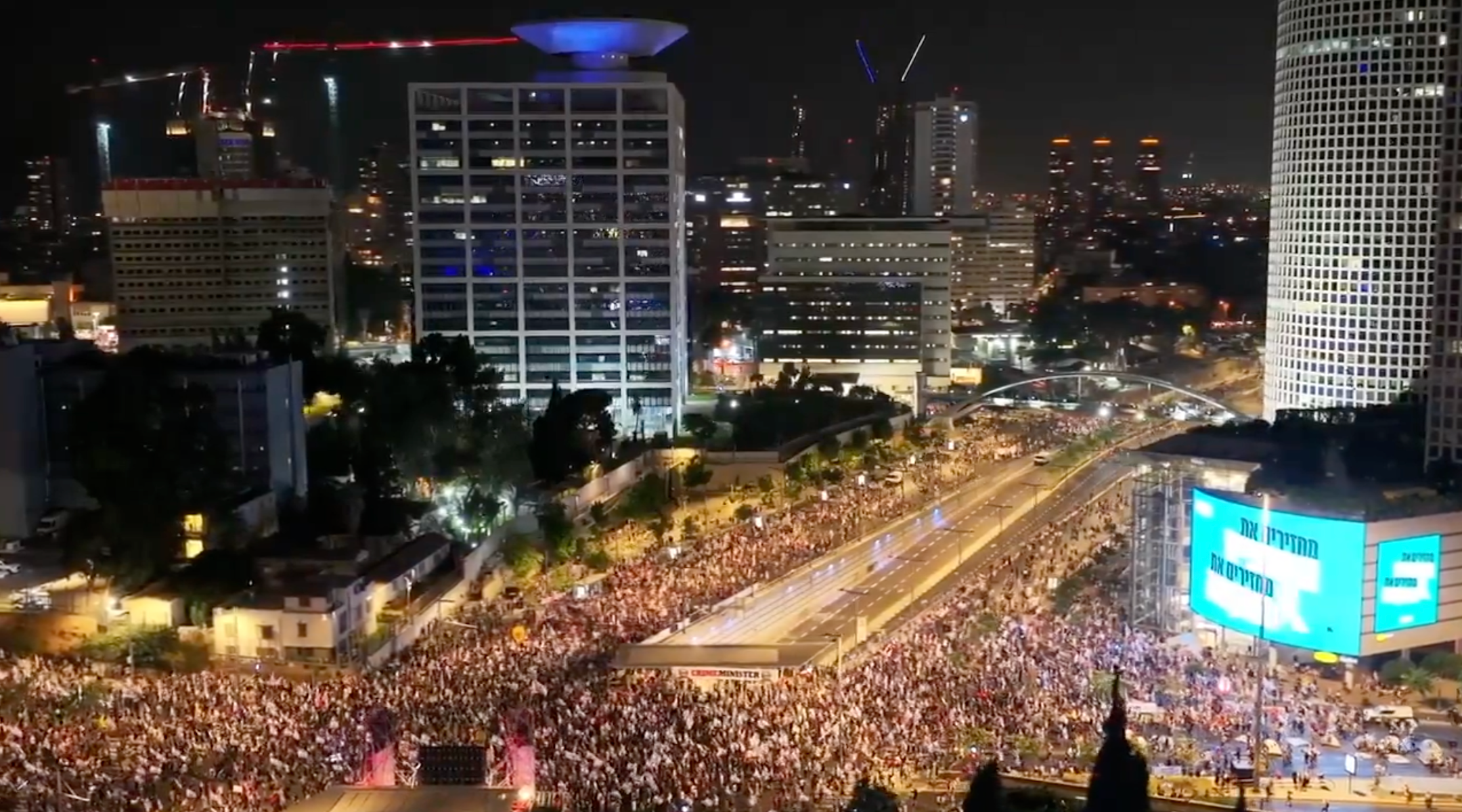Kamala Harris, as Israel-Hamas ceasefire talks teeter: ‘We’re not giving up’
Harris made the statement on the eve of the Democratic National Convention

Tens of thousands of Israelis rallied for a hostage and ceasefire agreement in Tel Aviv on August 17, 2024. (Screenshot)
(JTA) — Vice President Kamala Harris said she is holding out hope for a ceasefire deal in the Israel-Hamas war as reports emerged over the weekend that negotiations seen as promising were on the verge of collapsing again.
Separately, relatives of Israeli hostages are asking American Jewish leaders to pressure Prime Minister Benjamin Netanyahu to agree to a deal.
Campaigning in Pennsylvania on the eve of the Democratic National Convention, the Democratic presidential candidate was asked whether she thought Israeli Prime Minister Benjamin Netanyahu was ready to agree to a deal that would stop the fighting for an extended period in exchange for the release of Israeli hostages held by Hamas. She responded that she remained committed to reaching one.
“I will not speak for him, but I will tell you that these conversations are ongoing, and we are not giving up, and we are going to continue to work very hard on this,” she said. “We’ve got to get a ceasefire and we’ve got to get these hostages out.”
On Friday, prospects for a deal appeared to be brightening after more than 10 months of war and successive rounds of fruitless negotiations. Reports indicated that Iran would refrain from an anticipated attack on Israel if a ceasefire were signed, and on Friday, President Joe Biden said “we are closer than we’ve ever been” to an agreement.
On Saturday night, tens of thousands filled the street in Tel Aviv to rally for a ceasefire agreement and the release of hostages, and to call for early elections. Days earlier, hostage families sent a letter to the Jewish Federations of North America “publicly urging the Netanyahu government to sign the deal as presented by the US Government.”
Referring to the Jewish imperative to redeem captives, the letter added, “If we can seal the deal during this round of negotiations that began in Qatar today, we can fulfill the mitzvah of Pidyon Shevuyim and celebrate the High Holidays this year with our loved ones.”
But by Sunday, the negotiations appeared to be flailing. In a repeat of previous disputes between the parties, Hamas rejected the deal on the table, claiming that Netanyahu had added conditions to the agreement to which the United States had acquiesced. In a statement, according to Axios, Hamas claimed, “Netanyahu is still putting obstacles in the way of reaching an agreement, and is setting new conditions and demands with the aim of undermining the mediators’ efforts and prolonging the war.”
Hamas, which did not send a delegation to the recent talks held in Qatar, is demanding a permanent ceasefire, according to Axios — something that Israel rejects. Also at issue are the questions of who will control two strategic areas in the Gaza Strip now held by Israel: the Philadelphi Corridor in the south on the Egyptian border, and the Netzarim Corridor in the center of the territory.
In a statement on Sunday evening, Netanyahu said, “Hamas changed its position,” but acknowledged that disputes over a permanent ceasefire and control of the Philadelphi Corridor were the primary sticking points. Netanyahu said the ability to continue the war after a temporary ceasefire remained a “fundamental demand” of Israel’s.
“Today as well, the prime minister insists that we remain in the Philadelphi Corridor in order to prevent terrorist elements from rearming,” Netanyahu’s statement said. “The prime minister will continue to work on advancing a deal that will maximize the number of living hostages and which will enable the achieving of all of the war objectives.”
According to Israeli media, Israel’s own negotiators are urging Netanyahu to be more flexible. According to Israeli media, a meeting between Netanyahu and the negotiators erupted into an argument, as the negotiators warned that the opportunity to reach an agreement was slipping away and questioned whether Netanyahu was interested in reaching a deal. Defense Minister Yoav Gallant reportedly cautioned at the same meeting that the start of a regional war may also hang in the balance.
In response to the reports of the meeting, Netanyahu’s statement also slammed “serial leakers who are harming the ability to advance a deal.”












